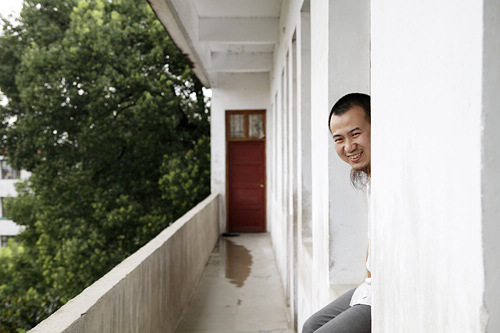|
 |
|
MAN WITH A DREAM: Li Yingqiang, in the Qingshi Middle School in Qichun County, Hubei Province, where the first rural library he established in 2007 is located (CFP) |
Tan Li joined the Gan Quan Library, a rural library in Chengde, north China's Hebei Province, after graduating from the Shanxi University of Finance and Economics in July.
"This work has nothing to do with my major at university," Tan said. "But this is something that I have wanted to do for a long time."
Tan, a native of central China's Hubei Province, came to the decision to work in a rural library because she wanted to help children enjoy learning. She believes China's rigid, exam-based education system prevented her from appreciating her high school studies.
"I didn't have any entertainment activities at that time. Everything I did was for getting high marks in exams," Tan said. "Study was no longer a pleasure at all. It is miserable and I really hate that system."
Tan never stopped looking for a better method of education when in college. But the experience serving as a volunteer teacher in a rural middle school disappointed her. "All volunteer teachers do is to help students get higher marks under the current education system. This is not what I want," said Tan, who one day happened to read about a program called China Rural Library (CRL).
The program impressed Tan so deeply that she applied to join it without any hesitation.
CRL is a program initiated by Li Yingqiang, a postgraduate from the prestigious Peking University in September 2007, which aims to set up as many libraries as possible in rural areas.
Coming from a small village in Hubei, Li set up the first library–Huang Kan Library–in his hometown, Qingshi Town in Qichun County in 2007. The library is named after Huang Kan, a famous scholar who originated in the county. All the subsequent libraries set up under the program are named either after celebrated local scholars or major donors.
After leaving his hometown to attend college in 1997, Li rarely found the time to return to his hometown. In 2006, he graduated from Peking University with a master's degree and started working for a Beijing-based NGO. The idea of setting up libraries in rural areas occurred to him during a business trip to Henan Province.
"On my way to Henan, I looked out of the window of the train and saw the desolate scenes of villages along the railway. They reminded me of my own hometown," said Li.
At the time, an article titled Everyone's Hometown Is Tainted was popular online and sparked heated discussions. The author, Ran Yunfei, revealed in the article how his hometown, a small village in southwestern Sichuan Province, lost its distinctiveness and beauty as a result of economic development. Almost all young villagers migrated to big cities and students in local schools spent most of their spare time either in filthy Internet cafes or wandering around and doing nothing.
The lack of access to learning resources is also evident in Li's hometown. "When I was in primary school, there were quite a few bookstores in town, they weren't great, but at least we had a place to go to buy books," Li said. "But now, they have almost all gone and the only one left sells only a few outdated school textbooks."
Li decided to do something to rectify the imbalance between the opportunities afforded to rural and urban students. After months of preparation, Li and his wife started the CRL program.
The Huang Kan Library was set up in the Qingshi Middle School. Li put a huge amount of effort into the program. "The school only provides rooms for the library. We have our own employees and we pay them independently," said Li, who believes the independence of the libraries is a key part of the concept.
At the beginning of the program, Li asked almost everyone he met for donations. "I was more than crazy in those first days," said Li, who finally received his first donation from CRL's logo designer.
"We worked out a list of books that are suitable for primary and middle school students and we want each library we set up in the future to have at least 4,000 books for the students to read," Li said.
| 